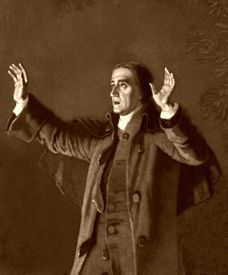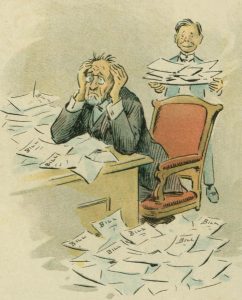By William Daugherty in 1891.
That Nevada has produced men of note in every walk of life, goes without contradiction, for their names are inscribed on the walls of fame and finance; in civil and political life; in the world of letters and the annals of crime; on charity’s scroll in the first and largest and most notable contributions to that noblest charity of all the Sanitary Fund, that administered alike to the victims of war, whether in blue or gray; and last and greatest of all, the meek followers of Christ, in all the sects and creeds known to Christendom.
Her clergy has numbered amongst them, those who have achieved lasting fame while quietly plodding the path of righteousness in perilous pioneer days, and who have received their reward with becoming meekness, that enables them to wear well the honors so worthily won.
At the head of the list we may be pardoned in naming among the earliest of the pioneers, Bishop Whitaker; Father Manogue; the eloquent preacher politician, Hammond; Reno’s favorite, Jenvey; and we may be excused for loss of memory in not naming others whose devotion entitles them to be inscribed on the roll of Christian martyrs. Their minds were developed here, where natural surroundings, desert perils, and privations, bring man nearer to God; and where freedom of opinion and man’s natural independence expand the mind to the utmost limits of admiration for the handiwork of God and nature. In consequence, liberal views have developed in the minds of some, and this may have been at variance with orthodox teachings; nevertheless, such divines have made friends with the masses, and if any ever betrayed evidence of mortal weakness, a generous public was ever ready to clasp his hand in warmer grips of friendship and palliate any shortcoming on the broad grounds that “man’s a man for a that.”
Among the popular preachers in the State, and who especially endeared himself to the pioneers of the eastern and central part of it, was one that many yet remember as genial Parson Kelly. He was skilled in his calling, scholarly and eloquent, and added a vein of life and jollity to every social gathering. True, he was sometimes restored to clerical dignity by the firm but gentle admonition of his devout and devoted wife, whose simple reproof, couched in the one word, “Samuel P,” would return his countenance to the gravity demanded of his calling. But, everybody liked him; the rich cultivated him; the sick took cheer from his presence; the giddy gave cheerfully to the contribution box; the best-liked him none the less, and the sports would have him bury their dead. Not a driver on the central stage lines but preferred him to anyone else on the box outside, and that genial wag, Tom Reilley, who drove into the last “home station” many years ago, used his strongest words of admiration when he said, “Kelly was a lizard.”
But, Kelly’s popularity led him into politics, and to give him a position that would prove congenial to his tastes, he was elected State Superintendent of Public Schools and moved to the capitol. Then, the greatest misfortune that falls to man befell him, and the death of his good wife checked his ambitions. At the close of his term, he drifted, perhaps unwisely into journalism, and became a hard-worked reporter on the San Francisco newspapers, at a time when stirring political changes called forth steady toil that soon became drudgery. He banished grief in the exactions of the new life and worked with a will to serve his new masters. Suddenly, he dropped the pencil and with his only child departed for the east, to end his life in the placid pursuit of his early calling in the quiet eddy of his old home. What led to his sudden resolve may be inferred by his old Nevada friends in the following: He was met by an old friend in San Francisco just after the election for the adoption of the new constitution. Reporters had been hard-worked in gathering returns, and Kelly told his friend of the fatigue.
“Well,” said the friend, “you were of course paid extra for the extra work?”
“No, not a bit of it,” said the former parson.
“What,” said his friend, “after being up so many nights, did not the rich proprietor of the leading daily pay you handsomely?”
Kelly’s look of disgust over the treatment would require an artist to portray on canvas, but there was no mistaking the tone with which he replied: “Naw. They didn’t even say beer.”
~~
By William Daugherty, for the Reno Evening Gazette, July 16, 1891. Compiled and edited by Kathy Weiser/Legends of America, updated January 2021.
About the Author: Written by William Daugherty wrote for the Reno Evening Gazette in 1891. The Gazette was first published on October 12, 1876, and continued for the next 107 years. In 1977, it was merged with the Nevada State Journal and continues to exist today as the Reno Gazette-Journal.
Note: The article is not verbatim as spelling errors, minor grammatical changes, and editing have occurred for the ease of the modern reader.
Also See:
Pioneers on the Nevada Frontier (Reno Evening Gazette)
Tales of the Overland Stage (Reno Evening Gazette)
Nevada Mining Tales (Reno Evening Gazette)


